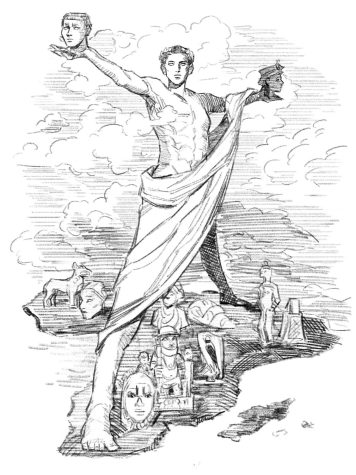The Senate Impeachment Trial
February 9, 2020
The Senate opened their trial on January 22 after weeks of hearings in the House that ended with President Trump being impeached. There were then more weeks of waiting as Nancy Pelosi elected to not immediately send the Articles of Impeachment to the Senate until she felt that there would be a fair trial.
Trump was impeached on December 18 on two accounts: abuse of power, and obstruction of justice. The abuse of power charge came against Trump for withholding $400 million of military aid from Ukraine until they started an investigation into potential 2020 presidential challenger Joe Biden, and his son Hunter Biden. This move of withholding money for political purposes is known as quid pro quo, although Trump refuted this accusation. The obstruction of justice charge came as Trump defied subpoenas for certain documents and witnesses that the House felt would be useful in the hearings.
Ultimately, both Articles of Impeachment were passed, although they were completely partisan, as not a single Republican voted for either Article. A few Democrats voted against the Articles, but the Democratic-ruled House was able to pass them nonetheless.
The Senate trial started with a marathon 13 hour session, where the rules for the trial were set. There were also some votes on bringing in new witnesses, which failed multiple times. In the trial rules, each side was given 24 hours total to give their opening arguments.
Adam Schiff, head prosecutor and Democrat from California laid out the evidence against Trump and the necessity for removing him from office. He made it clear that the trial was all about right and wrong, and that because Trump was clearly in the wrong, he should be removed from office. During his speech, he explained, “If right doesn’t matter, we’re lost,” in an attempt to appeal to not only Democrats, but also Republicans, that the impeachment is not about disliking Trump or the Rebuplican party, but about the nature of the crimes Trump committed.
While many Republicans praised Schiff and his team for their well-planned and delivered openings, that did not change many of their minds. Some still saw the impeachment as a way for Democrats to take care of Trump without actually beating him in the 2020 election.
Trump’s legal team defended him starting on January 25. Their main goal in their defense was to argue against the need for Trump to be removed from office, and also to explain why the Senate did not need to bring in new evidence and witnesses.
The case of new evidence is a main point of the prosecutors, as they feel that hearing from certain people, including former National Security Adviser John Bolton, acting White House Chief of Staff Mick Mulvaney, Mulvaney adviser Robert Blair, and White House budget official Michael Duffey will be beneficial to the trial. Not only might it help the prosecutors’ case, but they stress the importance of having all the evidence available for the American people. There would need to be a Senate vote to allow new witnesses, and a simple majority of fifty-one Senators would be required.
Since John Bolton was not allowed to testify, he is in the process of releasing a book that outlined what he knew that is scheduled for release in March. However, this release is too late for the book to serve much of a purpose in the trail, since it will be over by then. Even still, the book represents that there is always a possibility of new evidence emerging, which can change the trail completely.
Recently, head speaker, Republican Mitch McConnell said that he did not think he had enough votes to block new witnesses. This suggests that at least four Republicans would be willing to vote with Democrats. However, with the vote on January 31 in which Senators voted on whether to allow the possibility of new witnesses, the vote was 51-49 in favor of not bringing in new witnesses. The only Republicans to vote “yes” were Mitt Romney of Nevada, and Susan Collins of Maine.
In the end, even if the prosecutors gain enough votes to bring in new witnesses, the chance that Trump is removed from office is very slim. 67 Senators would have to vote in favor for this to happen, which would mean that around 20 Republicans would have to vote to remove him, which is highly unlikely due to the extremely partisan nature of the impeachment. If he was to be removed, it would be the first time in United States history that a president was removed from office. But with the result of the witness vote, which decided that witnesses are not allowed to testify, it is all but certain that Trump will be acquitted.
No matter the outcome, this will set a precedent for the future. Republicans believe that in the future, impeachment will be used as a political tool, not as it was intended by the founding fathers, which was to only use it if there was a clear crime that all parties could agree on. Democrats think that this impeachment shows that presidents are not above the law, and that if they blatantly break laws, they can be brought to justice.
[1] https://www.politico.com/news/2020/01/28/trump-impeachment-defense-senate-trial-107544
[2] https://apnews.com/b54b02d0a9d99f0f33ce4c95fd56f8e2
[3] https://apnews.com/3eec3ea9be5c07a9c297bad439f8f3e8
[4] https://www.wsj.com/articles/calling-all-trial-witnesses-11579652544
[5] https://www.npr.org/2019/12/31/787235305/how-a-senate-impeachment-trial-could-work


